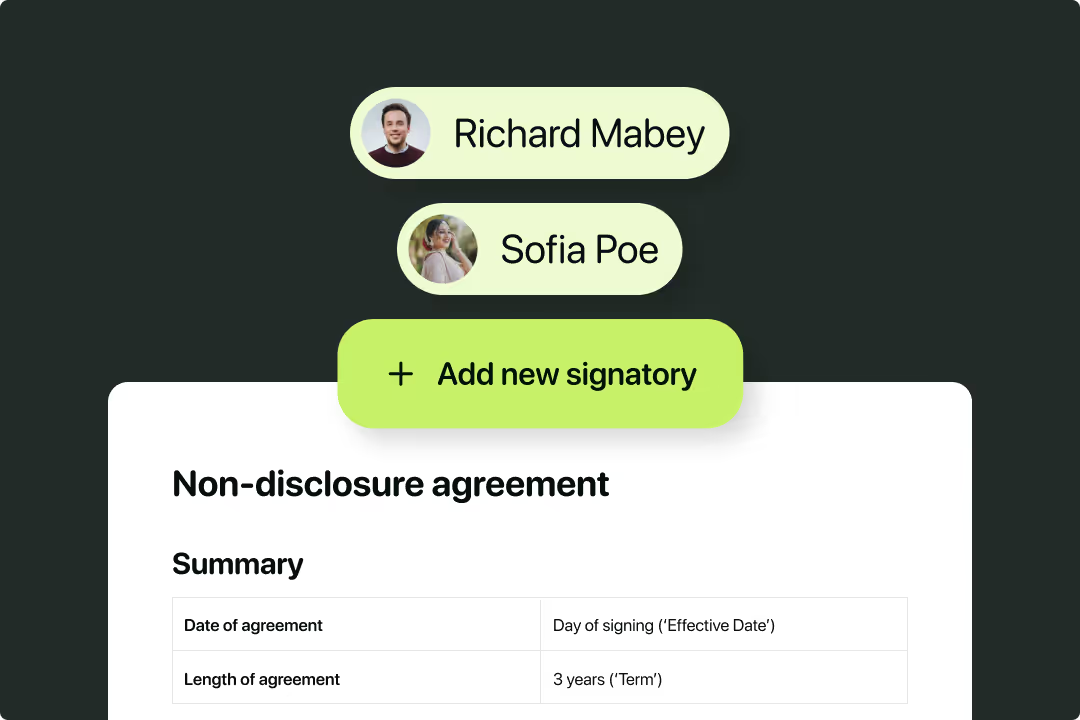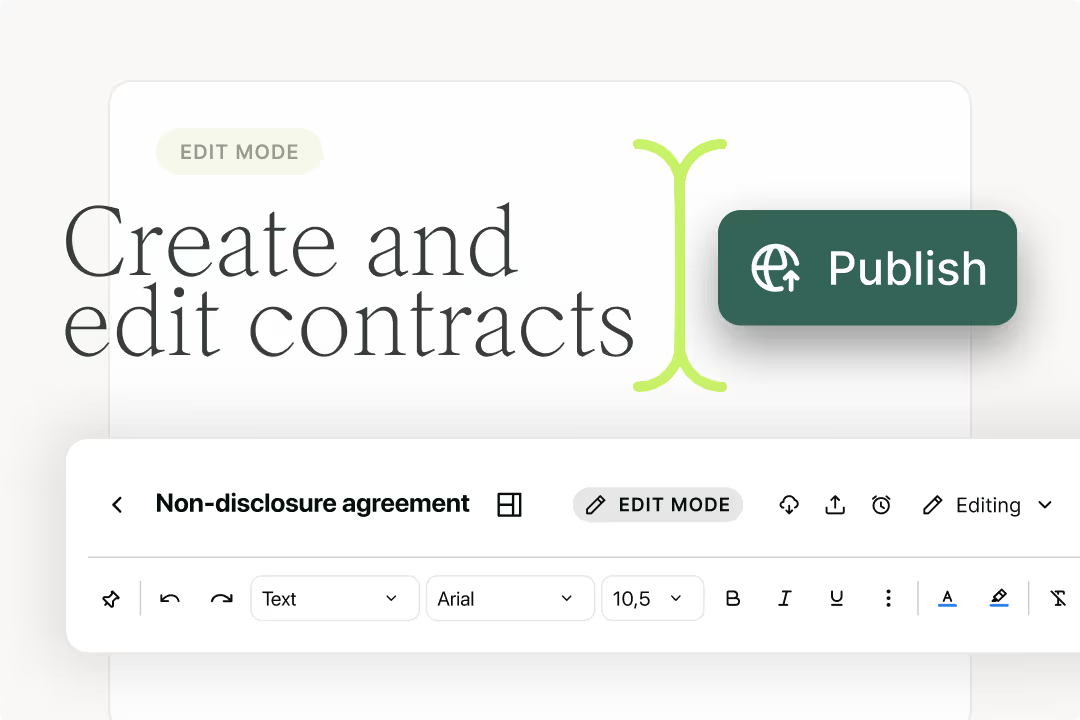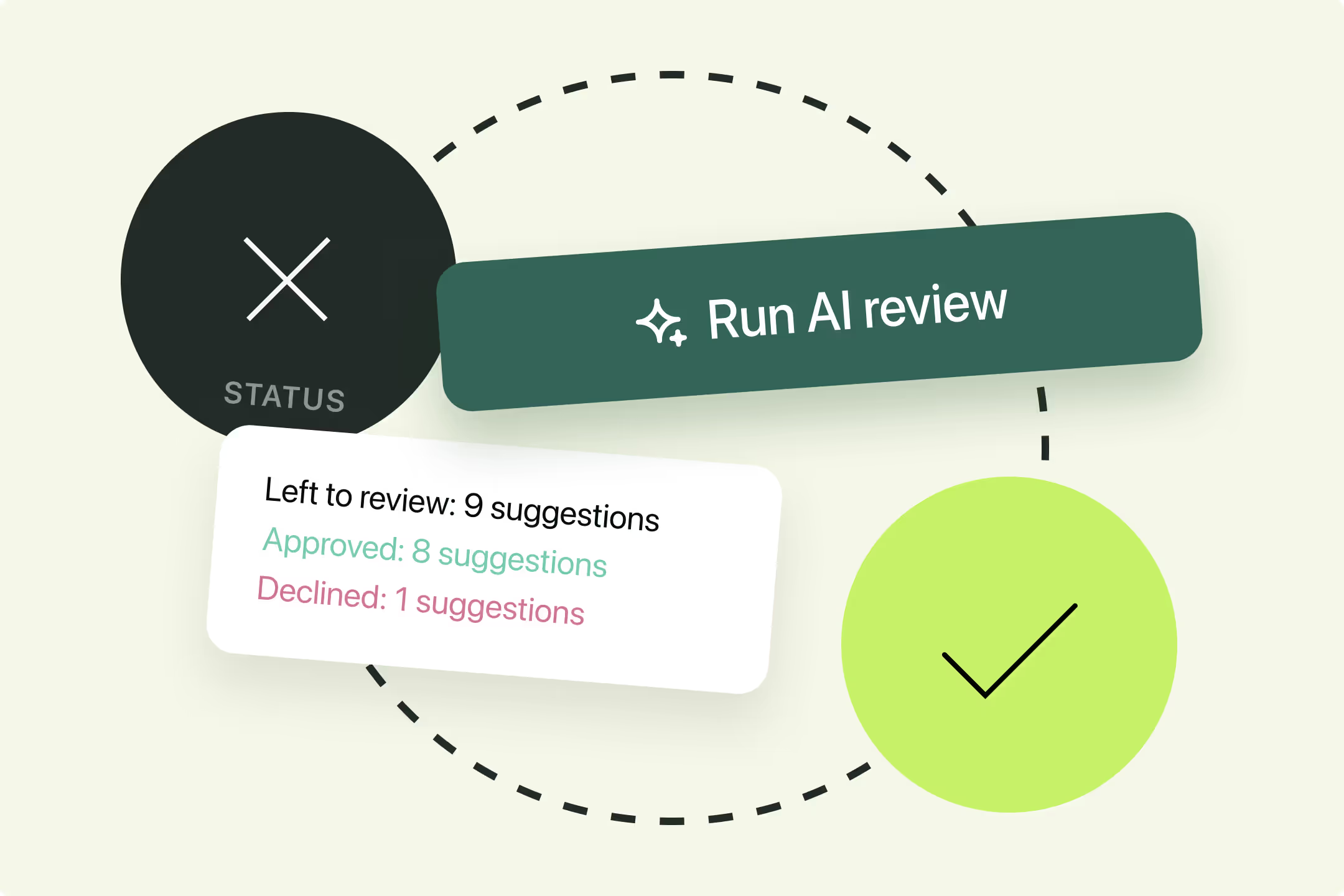Solutions
Customer Support
Resources
Contract administrators are the people who keep commercial relationships moving.
They take on the heavy lifting of getting contracts over the line, from coordinating drafts to managing approvals and signatures. Their work helps businesses close deals faster, minimise risk, and avoid getting stuck in endless admin.
But what exactly does the role involve, and how do you know if your business needs one?
A contract administrator handles the end-to-end contract workflow. They help draft, review, negotiate, and finalize contracts, making sure they meet business objectives and legal standards. Their job is to reduce risk, increase deal velocity, and make sure contracts don’t sit idle waiting for sign-off.
This can include:

While there’s some overlap, contract administrators and project managers are not the same.
Contract administrators focus specifically on how contracts move through their lifecycle. Project managers are responsible for broader project delivery and might only engage with contracts if they’re relevant to the project.
There’s no fixed list of qualifications you need to become a contract administrator—unlike more regulated legal roles such as solicitors or general counsels. While many employers prefer candidates with a degree in law, business, or a related field, it’s by no means a strict requirement.
That said, a strong grasp of legislation and contracting principles is essential, and this knowledge is often gained through legal education or qualifications. Experience is also key, with most roles expecting candidates to have a few years under their belt.
If you are keen to gain a competitive advantage, these contract management courses could be of interest to you.
Salaries for contract administrators vary widely depending on location, industry, and experience. Here’s what the data says today:
With the right mindset and exposure, contract administration can open up career paths across legal, commercial, and operational teams. Here’s where you can go next, and what you’ll need to get there:
If you enjoy improving workflows, managing tools, and supporting in-house legal teams, legal ops could be your next move. This role often takes ownership of tech, budgets, and process improvements across legal—not just contracts.
Ideal if you: love fixing processes and optimising how legal teams work.

This is a natural next step for contract administrators. The role usually involves managing more complex agreements, owning contract templates, and driving strategy around risk and compliance.
Ideal if you: want to deepen your expertise in contracts and own more complex agreements.
Strong understanding of contracts plus cross-functional collaboration makes contract admins well-positioned to move into revenue or commercial ops. These roles help align legal, sales, and finance teams to accelerate deals.
Ideal if you: enjoy aligning legal with sales and helping deals move faster.
If you're leaning more toward the legal side and have the right background or want to study further, becoming a paralegal or legal associate could be a logical shift. Your contract experience will be a huge asset.
Ideal if you: want to grow into a more formal legal career (especially in-house).

For those working closely with vendor agreements or supply chain contracts, a move into procurement could be a smart fit. You’ll already know how to negotiate terms, assess risk, and manage contract performance.
Ideal if you: want to manage vendor and supplier relationships more broadly.
This is a longer-term play, but contract administration gives you a solid foundation in deal mechanics, risk, and revenue flow. With the right exposure and experience, you could scale up to lead revops teams.
Ideal if you: have strong commercial instincts and a process mindset.
Ready for your next move? Whether you're looking to grow into a bigger role or break into contract management for the first time, we’ve got you covered.
Our in-house legal jobs board is updated daily with top opportunities across in-house legal, legal ops, and contract roles—handpicked to help you take the next step in your career.
From fast-growing startups to established legal teams, we surface the most exciting roles so you don’t have to dig for them.
Better yet, you can join our in-house legal community to get the roles sent to your inbox every Monday.
Contract administrators are often responsible for managing every stage of the contract process. From drafting to execution, they work across multiple teams to keep contracts moving. Juro helps them do this more efficiently, with fewer bottlenecks and less manual work.
Here’s how contract administrators use Juro to take control of their workflow:
Juro's automated contract templates allow contract administrators to create contracts in a matter of minutes. Using conditional logic and pre-approved language, they can self-serve on routine agreements without needing to rely on legal for every edit.

Instead of switching between Word, email, PDF tools and shared drives, Juro brings the entire contract lifecycle into one place. Contracts can be created, negotiated, approved, signed and stored in a single workspace.
Contract administrators can manage feedback internally and externally using in-browser comments and tracked changes. This makes version control simple and reduces the need for long email chains or duplicated documents.

With full visibility into each contract’s status, contract administrators can see who is holding up a review or approval. Automated reminders help keep contracts moving without the need to chase people manually.
Using Juro’s conditional logic and approval workflows, contract administrators can ensure the right language is used every time. This improves compliance, reduces errors, and limits unnecessary escalations to legal.
Want to see it in action? Book a demo to find out how Juro can support your team.

Lorem ipsum dolor sit amet, consectetur adipiscing elit. Suspendisse varius enim in eros elementum tristique. Duis cursus, mi quis viverra ornare, eros dolor interdum nulla, ut commodo diam libero vitae erat. Aenean faucibus nibh et justo cursus id rutrum lorem imperdiet. Nunc ut sem vitae risus tristique posuere.

